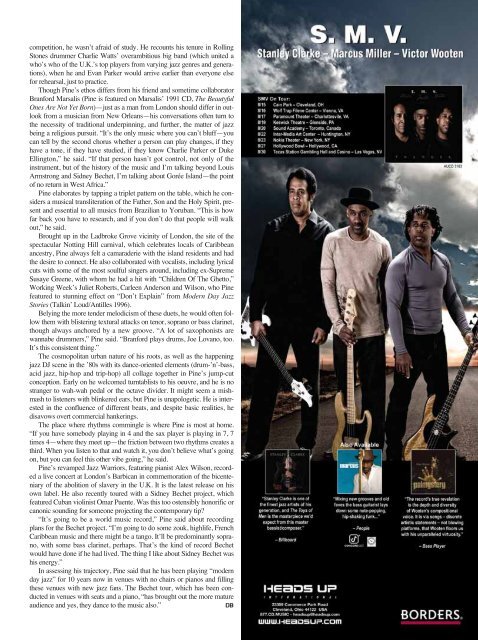Download - Downbeat
Download - Downbeat
Download - Downbeat
You also want an ePaper? Increase the reach of your titles
YUMPU automatically turns print PDFs into web optimized ePapers that Google loves.
competition, he wasn’t afraid of study. He recounts his tenure in Rolling<br />
Stones drummer Charlie Watts’ overambitious big band (which united a<br />
who’s who of the U.K.’s top players from varying jazz genres and generations),<br />
when he and Evan Parker would arrive earlier than everyone else<br />
for rehearsal, just to practice.<br />
Though Pine’s ethos differs from his friend and sometime collaborator<br />
Branford Marsalis (Pine is featured on Marsalis’ 1991 CD, The Beautyful<br />
Ones Are Not Yet Born)—just as a man from London should differ in outlook<br />
from a musician from New Orleans—his conversations often turn to<br />
the necessity of traditional underpinning, and further, the matter of jazz<br />
being a religious pursuit. “It’s the only music where you can’t bluff—you<br />
can tell by the second chorus whether a person can play changes, if they<br />
have a tone, if they have studied, if they know Charlie Parker or Duke<br />
Ellington,” he said. “If that person hasn’t got control, not only of the<br />
instrument, but of the history of the music and I’m talking beyond Louis<br />
Armstrong and Sidney Bechet, I’m talking about Gorée Island—the point<br />
of no return in West Africa.”<br />
Pine elaborates by tapping a triplet pattern on the table, which he considers<br />
a musical transliteration of the Father, Son and the Holy Spirit, present<br />
and essential to all musics from Brazilian to Yoruban. “This is how<br />
far back you have to research, and if you don’t do that people will walk<br />
out,” he said.<br />
Brought up in the Ladbroke Grove vicinity of London, the site of the<br />
spectacular Notting Hill carnival, which celebrates locals of Caribbean<br />
ancestry, Pine always felt a camaraderie with the island residents and had<br />
the desire to connect. He also collaborated with vocalists, including lyrical<br />
cuts with some of the most soulful singers around, including ex-Supreme<br />
Susaye Greene, with whom he had a hit with “Children Of The Ghetto,”<br />
Working Week’s Juliet Roberts, Carleen Anderson and Wilson, who Pine<br />
featured to stunning effect on “Don’t Explain” from Modern Day Jazz<br />
Stories (Talkin’ Loud/Antilles 1996).<br />
Belying the more tender melodicism of these duets, he would often follow<br />
them with blistering textural attacks on tenor, soprano or bass clarinet,<br />
though always anchored by a new groove. “A lot of saxophonists are<br />
wannabe drummers,” Pine said. “Branford plays drums, Joe Lovano, too.<br />
It’s this consistent thing.”<br />
The cosmopolitan urban nature of his roots, as well as the happening<br />
jazz DJ scene in the ’80s with its dance-oriented elements (drum-’n’-bass,<br />
acid jazz, hip-hop and trip-hop) all collage together in Pine’s jump-cut<br />
conception. Early on he welcomed turntablists to his oeuvre, and he is no<br />
stranger to wah-wah pedal or the octave divider. It might seem a mishmash<br />
to listeners with blinkered ears, but Pine is unapologetic. He is interested<br />
in the confluence of different beats, and despite basic realities, he<br />
disavows overt commercial hankerings.<br />
The place where rhythms commingle is where Pine is most at home.<br />
“If you have somebody playing in 4 and the sax player is playing in 7, 7<br />
times 4—where they meet up—the friction between two rhythms creates a<br />
third. When you listen to that and watch it, you don’t believe what’s going<br />
on, but you can feel this other vibe going,” he said.<br />
Pine’s revamped Jazz Warriors, featuring pianist Alex Wilson, recorded<br />
a live concert at London’s Barbican in commemoration of the bicenteniary<br />
of the abolition of slavery in the U.K. It is the latest release on his<br />
own label. He also recently toured with a Sidney Bechet project, which<br />
featured Cuban violinist Omar Puente. Was this too ostensibly honorific or<br />
canonic sounding for someone projecting the contemporary tip<br />
“It’s going to be a world music record,” Pine said about recording<br />
plans for the Bechet project. “I’m going to do some zouk, highlife, French<br />
Caribbean music and there might be a tango. It’ll be predominantly soprano,<br />
with some bass clarinet, perhaps. That’s the kind of record Bechet<br />
would have done if he had lived. The thing I like about Sidney Bechet was<br />
his energy.”<br />
In assessing his trajectory, Pine said that he has been playing “modern<br />
day jazz” for 10 years now in venues with no chairs or pianos and filling<br />
these venues with new jazz fans. The Bechet tour, which has been conducted<br />
in venues with seats and a piano, “has brought out the more mature<br />
audience and yes, they dance to the music also.”<br />
DB
















